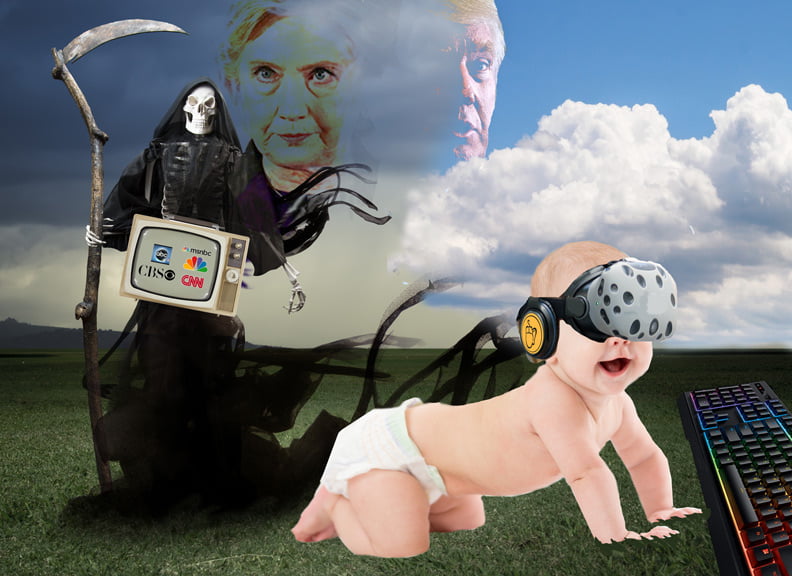Differences in the candidates didn’t determine the winner of the 2016 Election.
Instead, what you’re doing right now did.
The Growth of New Media Determined the Election of 2016
Changing media determined the election. Instead of candidate positions and differences in ideology determining the winner, the winner was instead determined by the dynamics of a changing media landscape. It was pointed in that direction decades before 2016.
If you woke up from a coma that lasted for the last three years, from 2014 to 2017, and someone explained to you where the United States was now, you probably wouldn’t believe them. You’d be like “OMG how did we get here? How did Donald Trump become President? Did the media all go insane?”
Nobody went insane. Everyone played their roles in a script written by forces larger than most people want to imagine, hidden out of sight, pulling each player’s strings, including our deepest loyalties. What happened wasn’t senseless or chaotic. Instead it was a script written in stone and the players were limited to their roles, unbeknownst to them perhaps, but played perfectly. The media industry would have attacked anyone playing the role Donald Trump inherited, and would have still made the same mistake accelerating their losses even if it had been a different Republican candidate.
Changing Media Created Winners and Losers
There’s so much that changed, in the media industry, in the political industry, so quickly, like an avalanche that had been building season after season. It came falling down, landing on homes from a mile above, covering this land in a blanket of confusion, separating our identities more than ever.
There’s so much that’s unbelievable; that’s why there’s so much confusion, so much division, not just between people, but inside people themselves.
Here’s what’s unbelievable:
First you’ve got this guy who was a celebrity, known for saying “you’re fired” over and over to people who were clamoring for his affirmation, but fell short, shamed on public television. He profited from the identity as an over-judgmental, yet entirely justified, razor-like metaphor for American business. Perform or die, or “you’re fired.”
It’s not unfair to say he, through his own will, created this identity as a Machiavellian icon of capitalism, a sort of “bad guy” to the masses who aren’t as adept or connected. The identity wasn’t that of a blue-blood who plays by the rules, who we expected. It wasn’t a Jeb Bush, but rather the opposite, someone who got where he is by not taking any prisoners, getting his hands dirty, by being brilliant and precise. This was his identity before the race. It’s gained many facets since, some of which are in contradiction, but this was the identity he stepped into the spotlight with the day he announced he’d run.
What made Donald Trump the New Media Candidate is hard to ignore, despite how strong Bernie and Hillary’s online strategies and online audiences were. He became the New Media Candidate first because of his use of Twitter. He got the attention he needed online, through social media. He played New Media well and often and seemed to enjoy it the same way so many of us do.
It’s unbelievable how little he spent, this New Media Candidate, and still overcame the odds.
When his campaign spent less than half of what the other candidate’s campaigns spent, he essentially bucked the trend that said you had to outspend a competitor to win. With Trump’s campaign strategy spending less than half and still winning, he demonstrated that ads weren’t worth even half of their price, and became the enemy of Old Media for doing so, he became the New Media Candidate that shouldn’t have won by the old standards.
Who Expected The New Media Candidate?
And then he won. He won against who was supposed to be a shoe-in, someone with the incredible advantage of having a novelty factor on their side, a chance for voters to produce the first woman president. So many odds were against him, but the one factor that seemed to propel him in spite of these odds was this pre-polarized identity. So many people who disliked what he represented were pre-tuned to hate him. This polarized identity could have been a liability, but instead it was leveraged in an almost aikido-like fashion, redirecting opponent effort towards your benefit and their loss. This didn’t temper the polarity – instead it magnified it. The campaigns each thought they had a benefit towards magnifying it, this negative attention focused in an unprecedented manner, but only one seemed to benefit from it in the end, the winner.
Here’s where the American psychology makes it interesting. Most people weren’t cognizant of being pre-programmed to identify him that way. They were no more inclined to believe Donald Trump was the role he played on TV any more than anyone from the seventies thought that Henry Winkler wasn’t really cool. He was the Fonz. How could he not be cool? The more of a polarity these characters created, the more we were aware of them and integrated their extremes into the limits of our own programming.
In the same token, how could Donald Trump really lead without division? How could the pre-programmed television consumer step away from their programming, and think outside it? Most people aren’t even aware of being programmed, but we really are, right down to the words we’re given to speak and think with. We couldn’t do that if we weren’t programmed.
Our Media Determined Our Programming
“Programmed” implies you’re under someone else’s control, but that’s not necessarily the case. “Programmed” may simply mean that you’re in possession of a program to operate with, a system to work with, rather than having none. You’ve been shown something, and you picked it up. How well could you think without language? Language is a program, and as free as it makes us to share things, ideas like I’m sharing with you now, it also sets our limits. How could anyone really know the upper limit of what “cool” was until they had seen the Fonz, for example.
So language, symbols, icons, and roles all have implications. They’re part of systems, part of programs. We adapt to them voluntarily and through imposition. Some systems don’t challenge our instincts and values, and everyone adopts them easily and without conflict. For example, you rarely hear someone declare: “I’m going to use the English Language, and all the letters when I speak, except the letter “R”. That’s my own thing and I’m doing it.”
But you do hear people picking and choosing from other elements of programming, particularly when expectations conflict with instincts. To some, it’s natural and good to indulge in things that others would never even think to try. Some people have strong instincts to exhibit one behavior, others have strong instincts to avoid it. Like for example with belief systems: Some people instinctively gravitate towards belief systems, others instinctively gravitate away. Some people give a lot of credence to established authority, some do not. There will always be a spectrum whenever there’s an expectation imposed on people. Some will loyally follow the program, some will make intentional efforts not to. There’s a spectrum of expectation we create for our behavior, and the behavior of people around us, that’s defined at its limits from the extreme characters, whether gods or heroes, real or imaginary, drawn from story and the media we’re exposed to.
Storytellers Build Authority That Feels Voluntarily
Even though we have a system of government, elected leaders, police and military who obey them, there’s still an authority that’s been accrued over the last century by network broadcasting brands. This authority isn’t the authority people are legally restricted to follow. Instead it’s the classic alt-authority, the “other” authority people have chosen pseudo-voluntarily. With a veneer of control afforded via the channel knob which evolved into the on-screen guide, people can choose from a pre-selected menu of choices, and feel like they’re creating unique identities from it. This appearance of control, together with the aspect that it’s voluntary, make television an authority for people who might not otherwise feel loyal to the official authority of government, but as human need to be drawn to some kind of alt-authority nonetheless.
Television was the de-facto director of American culture
For a few generations shows were produced to be broadcast on a national level, appealing to and incidentally programming Americans. These shows became the defacto directors of American culture. That same programming paradigm produced Donald Trump, he was born within it, and wouldn’t have had the identity created around him without it.
But then something different happened. Something else was going on that competed for American attention, stole some of the most engaged eyeballs. Just like the silver screen saw it’s monolithic influence drift into the second screen, our TVs, now there’s third and fourth screens, and soon screens will be no more. Desktop computers evolved from being stand-alone gaming consoles and word-processing appliances. Now they’re the new means where people are informed, the new competitor platform for how American culture gets dictated.
New Media Competes Against Television for Audience
The third and fourth screens are formidable. Computers and mobile devices give more control, more choices and an entirely different dimension: social interaction. Two way communications. People don’t just get told what to do, they say what they’re doing. And often the most engaging content is people doing what they’re told not to do. It’s a literal genie in a bottle – and all sorts of crazy wishes are coming true. People are able to choose their programming, and share how they’ve reprogrammed themselves.
Just like it’s unreasonable to expect people to start using English to communicate, yet leave out some letter from how they use it, it’s also unreasonable to expect people to have the power of the third screen, the ubiquity of the fourth screen, and not use them completely. Whatever the range of abilities these new media confer, people will discover and exploit them all as certain as people learning English will learn about the letter “R”.
Movement of Audiences to New Media Isn’t New
The behavior of the participants, the state of affairs we see today is all implicit within this set of set of new powers. There is a pattern, a script, a language and a progression of letters. The set is not broken. The set is complete. If it seems confusing, or like it should’t be progressing this way, like there’s chaos and not order, it’s not for lack or order, it’s because you haven’t seen the order yet. The confusion comes from not knowing the language, not knowing the icons, the roles implied and the evolution that’s unavoidable. I’m about to explain this order, this pattern.
A Dying Media’s Dance of Death
Print has suffered. Newspapers were once the strongest directors of American culture; print at one time ruled. Then the electron’s power allowed radio, movies, and television. American culture progressed, but always directed in a centralized fashion by a few with the means to produce and broadcast. Media giants ruled and were the dictators of culture, rulers of the fourth estate. The centralization, the limited ratio between producers and consumers, was an implicit part of the broadcasting industry, even local broadcasting, and few envisioned this changing; broadcasting will always be about a small number of people speaking to the vast majority. But it was destined to change. Media platforms apparently have life spans, and when they’re at the end of their peak the brands built around them all seem to do a similar Dance of Death when they refuse to adapt, thrashing out against the sureness of the change with less grace than those who fell before them, rejecting the opportunities presented by new media forms instead of embracing them.
Decentralized New Media Sharing vs. Authoritative Dying Media Broadcast
Let’s think about decentralization for a moment. Imagine if every house or business generated all the electrical power they consumed on site, whether through solar, wind or even something like what they had in “Back to the Future” – a mini fusion generator. Electrical companies wouldn’t be needed. Neither would electric lines or power plants. The entire industry would flip over and companies that weren’t able to re-invent themselves would wither, like Kodak has, unable to transform into the copier business and finally into the digital camera industry. Kodak could have become the next Xerox, next Canon, next Hewlett Packard, Adobe, Samsung etc. Their identity was too strongly tied to an outdated technology, and as the demand for that technology waned, so did they. What happened to them will happen to major energy companies if electrical power generation becomes decentralized.
Now, today, we see that. We see demand for national broadcast media changing rapidly. Although there are still shows that have loyal audiences, the hegemony enjoyed by the industry is no more. The almost exclusive privilege of directing American Culture has waned as the demand for the technology, television, that these brands have their identities tied so strongly to, is weakening. This is easily quantified by the flow of ad dollars away from the second screen, TV, and towards the third and fourth screens, interactive devices.
New Media Advertising is Better For Too Many Reasons
The real defining factor, the factor stakeholders for the second screen are totally aware of, and watching eat their lunch daily, is how the barrier to advertising is many degrees lower online than it is to advertise on the second screen, even with local cable. A mom-and-pop shop could hypothetically take a video of themselves with their camera and turn it into a really rough but potentially effective YouTube ad. Non-animated banners are simple to make, and anyone with a credit card can start buying impressions for them from Google AdWords, now easier than ever. Anyone can advertise – you don’t need to produce a high-end television commercial and invest 5K to get started. You can get ads rolling, if you do it yourself, for a few hundred bucks.
Whoa! That’s a disruptive technology. Television people must have the same sunny attitude towards the Internet as telegraph people had about telephones.
Media with Growing Audiences Enjoys a Virtuous Circle
So what you have, as a result of increased ad sales, is more people being driven to produce better content online. It’s because of a merit based, immediate reward system that never existed before. Advertisers are the fuel in this virtuous circle, migrating from traditional media to online tactics. Better content, more audience, more ad results, more ads. Then repeat. It’s a virtuous circle that is very difficult to compete with, an almost viral dimension impossible for the second screen brands to tap into and still keep their identities.
Old Media, No Matter How Popular It Was, Can’t Be New Again
So that’s what changed. That’s the foundation of the pattern that was set up, pre-destined and implied by the emergence of online communications. Part of that pattern is the inevitable reactions demanded by the roles involved. Let’s examine people and motivations now that we have an idea of the forces they’re reacting to.
It wasn’t the players, but their roles in he evolution of media technology, that determined the outcome of the 2016 Election.
We can observe a dynamic, a pattern that might as well have been written in stone. This pattern of technological progress and evolution created roles. The candidates, the specific players in those roles, had to perform within their limits even when it went against their best interests. Old Media brands and the candidates they supported had no real chance of maintaining their brands gracefully against the change and adapting. Instead they eroded their brands by trying to resist the evolution. Looking back at it allows this hindsight to be 20-20, but lots of people felt something new and dramatically different was happening as it was happening, but didn’t necessarily articulate it. Why was the Old Media losing it’s cool, getting hysterical, and sacrificing their credibility so openly? Couldn’t they hide the certainty they had seeing the end coming, and at least try to change course? Could they? No. Let me explain why:
Imagine You’re a Stakeholder in Old Media, the “Formula Necessary to Win”
As an advertiser, in the ad industry, it’s important to be able to project yourself into the mind of your audience you’re marketing to. To understand them you have to get into their role, to think about what their hopes and fears are, and spend time thinking about what motivates them. So let’s put ourselves into the role of television executives and people with big money in broadcasting for a second. Try to understand how their motivations precipitated their choices, and made things happen the way they did. Imagine you’re a television decision maker, a person whose career, fortune, profit and future are tied to consumption of the technology.
- Ads are your bread and butter.
- Advertisers are who you serve, who you need to make happy.
- If you’re selling ads for big bucks you’re good. If you’re not selling them, it’s not good.
Easy Money Didn’t Come as Easy as Expected
Then one day there’s an election.
- One candidate is raising a lot of money that you see coming your way.
- Another isn’t as much.
- One candidate is being given a lot of money from those same people who are giving you money to run ads.
- The other candidate isn’t getting money from those same people.
As the election progresses, the one you and your clients like is spending that money with you, but it isn’t really having the effect you had them convinced it would. The other candidate is spending a lot, lot less. Plus that other candidate is getting a lot of attention on this competitor technology, this lousy, stupid Internet. In fact, lots of people who are best at getting attention on this new media are giving most of their attention to this other candidate. You hate them, they suck. They should be working for you, for “exposure”, instead.
What if Half of the Old Market Stopped Buying Your “Formula to Win”?
So what do you do? Do you stay out of it, jump on this new bandwagon, adapt, transform, listen to your audience? Can avoid taking it personally as this new thing makes what you’ve built less?
Or do you circle the wagons and institute an aggressive bias among your talking heads, against this guy? Can you resist attacking him? I think most people in the television industry couldn’t resist it, and didn’t see any good reason not to. They all did it. They couldn’t resist attacking him even if they had the wisdom to anticipate it hurting them worse.
What happens when the candidate who drank less of your “formula necessary to win” then goes on to win?
You’re the dad. Your boy has two choices to date, a young lady you like and you haven’t found many reasons to like yet. The last thing in the world you want to do is this no matter how “good your relationship is with your child and how much they respect you” : never endorse the one you like.
You’re old. You’re out. You can’t understand because you’re dad. The best thing you can do, old wise man, is keep your opinion to yourself, or better yet praise the one you don’t like equally so you hid your bias. You might even want to go false-positive on the one you like less, and how she reminds you of the kid’s mom, or better yet, you. It’s called reverse psychology, and it’s a strategy that works, particularly when there’s a position of authority acting to oppose an emerging force. Broadcast media could have played it this way at a minimum, knowing adaptation was unlikely, but that’s not how it went down.
A Wise Man Once Said Nothing. Probably Because Nobody Was Stealing His Lunch.
Television decision makers did not realize “they’re dad”. They still thought they were cool. They invented cool, after all.
It’s not that Dad doesn’t still have power, and still isn’t most relevant, but Dad has to realize he isn’t ever going to be cool again.
Television programmers considered their interests rather than a bigger picture where their roles were part of an evolution of technology. Instead of being smart, being graceful, playing social aikido and reverse psychology, they gritted their teeth and made clear their dislike, pulling no punches and performing bonus drama. They made clear their bias, not recognizing that one of their own had penetrated a different dimension, like a child onto a technology far cooler than anything dad knows how to do. Instead of following, playing along, and weighing him down with their praises they did the opposite, thinking their endorsement and criticism had a hegemony, and that it alone was golden.
But the kid was way past them already. And whatever they criticized got promoted instead. So it worked against them. So against them. It’s so cliche once you see it.
When your bias is so transparent, the more emphatically you repeat your opinion, the worse it erodes your credibility. People expect this from snake oil salesmen, not information sources whose brands are only as valuable as their credibility. Forgetting their roles, thinking it still had a monopoly as in information source, old media couldn’t see it’s role.
Old Media brands denied their place in change, and began to destroy themselves, credibility first.
History Forgotten Leads to the Same Bad Decisions, Soon Repeated
This is worth learning, and remembering, because it will happen again. People in the communications and politics industries shouldn’t forget that a new technology will emerge that makes the best Web 2.0 sites like Facebook and Twitter wane. And there will be a new candidate at that time, who resonates with the audience using that new technology. And that new candidate, if resisted in the same manner by whoever is on top online, will also enjoy success beyond their own ability. They’ll be rocketed beyond whatever shoe-in is chosen by the online industry. And it will be accelerated by the resistance, the opposition of the online industry. Brands will signal their bias, and lose all the precious credibility accrued. They’ll make their opposition inherit that credibility instead, because, deep down, they’re really not in opposition to that candidate, but instead to the technology destined to eat their proverbial lunch.
The Darling of Old Media Inherits an Albatross
Although you could read this and think of it as a tip to sell short on today’s web 2.0 giants when you feel the worm turning again, it’s more of an admonition for those brands. Don’t destroy your shareholder’s investments by failing to recognize where you are in the cycle of technology. Don’t forget how established Old Media didn’t resist telegraphing anxiety about New Media, and how it backfired so badly.













